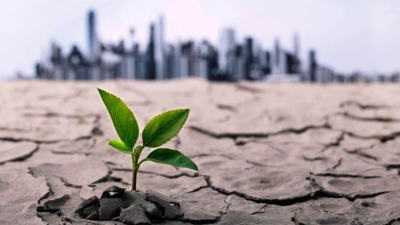Critical Report Warns Global Temperatures Set to Rise 2.9 Degrees by Century’s End
Wegdan Mohammed

A few days separate us from the start of the world’s largest climate event, COP 28, hosted this year by the United Arab Emirates.
A recent report by the UN Environment Programme reveals that current global efforts are insufficient to limit the rise in average global temperatures to 1.5 degrees Celsius, with projections indicating a potential increase of 2.9 degrees by the end of the century.
This follows a year marked by alarming acceleration in climate-related records, with 86 days recording temperatures exceeding pre-industrial levels. September stood out as the hottest month ever.
The report warns that these temperature increases lead to destructive extreme events, signaling a foreboding future catastrophe.
Contrary to common belief, a 2.9-degree Celsius rise doesn’t simply mean a few extra degrees in summer; it disrupts the entire climate and ecological system.
This will intensify extreme weather events such as heatwaves, droughts, floods, storms, and wildfires. Global sea levels may rise by up to one meter by the century’s end, threatening coastal cities.
Additionally, the Earth could lose up to 40% of the Amazon rainforest, trapping more carbon dioxide in the atmosphere. There are critical tipping points, like the melting of ice sheets in Greenland and Antarctica, and disruptions to ocean currents, that, if surpassed, lead to irreversible climate changes.
Emissions of greenhouse gases reached a new record of 57.4 gigatons of carbon dioxide in 2022, with a projected 16% increase by 2030.
Despite the Paris Agreement’s goal of a 42% reduction in CO2 emissions by 2030, the report emphasizes the urgent need to uproot the root cause of the climate crisis: fossil fuels.
In conclusion, the report calls for accelerated development towards a low-carbon economy and urges high-emission countries to take greater action while supporting developing nations in avoiding climate disasters they didn’t cause.











